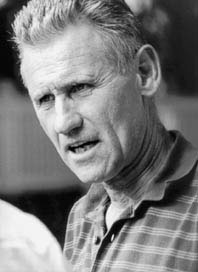 Rudolf Thome (b. 1939) is a German director who had three films, the "Forms of Love" trilogy, shown in the 1990 AFI/LA International Film Festival. These were the only films I have ever seen (not for lack of trying) from a filmmaker who, according to the Internet Movie Database, has directed 23 features and, according to Thome, will have his 24th debut at the Berlin Film Festival in 2004 and his 25th go into production a month thereafter. I recently came across the following reviews I wrote for two of the films (two of Das Mikroskop, one of Der Philosoph) for two publications.
Rudolf Thome (b. 1939) is a German director who had three films, the "Forms of Love" trilogy, shown in the 1990 AFI/LA International Film Festival. These were the only films I have ever seen (not for lack of trying) from a filmmaker who, according to the Internet Movie Database, has directed 23 features and, according to Thome, will have his 24th debut at the Berlin Film Festival in 2004 and his 25th go into production a month thereafter. I recently came across the following reviews I wrote for two of the films (two of Das Mikroskop, one of Der Philosoph) for two publications.THE MICROSCOPE (DAS MIKROSKOP)
The first film in West German writer-director Rudolf Thome's "Forms of Love" trilogy establishes a tone of earnest romanticism leavened with wry wit perfectly suited for its tale of amorous obduracy.
The film opens with the fracturing of a longtime romance between the ardently in-love Maria (Adriana Altaras) and her computer-programmer lover Franz (Vladimir Weigl). The somewhat dry Franz is definitely in love with Maria, but her talk about children has frightened him off, and he tries to sublimate his desire in a madly intensive interest in home aquaria and a casually sexy romance with Tina (Malgoscha Gebel), a woman he meets on the street.
Maria, however, is not one to give up easily, and she outflanks Franz by befriending Tina and refusing to be brushed off.
Though Maria's story takes up much of the external action, Thome is equally interested in Franz's internal drama. For Thome, Franz's scientific and intellectualized hobbies are merely hopeless male gambits to escape a romantic nature that is by rights as warm and affectionate as any woman's, and when Franz trades in his fish tanks for a microscope and becomes engaged by the mating habits of single-cell organisms, the game is up.
Thome is a critic of sexism, not because women have been denied their fair credit for "male" characteristics - Maria, despite modern trappings, is a classic cinematically romantic woman -- but because men haven't had sufficient justice done to their 'female' side.
The film preaches a gospel of equally, submissive susceptibility, an iffy proposition made palatable by its warm, good spirits and regular flashes of psychological insight, (3 p.m. Sunday)
– Henry Sheehan in Hollywood Reporter, June 15, 1990
The Microscope (Der Mikroskop)
A curious film, both reluc-tantly modern and longingly old-fashioned. Franz (Vladimir Weigl), a computer programmer deeply in love with his longtime girl friend, Maria (Adriana Altaras), is frightened off by her talk of children. Burying himself in semiscientific hobbies, first fish tanks, then a microscope, he finds himself drawn with increasing passivity back from science and into the world of amour. This is the initial entry in German writer-director Rudolf Thome's Forms of Love trilogy, and it sets a thematic pattern of men bamboozled by their own delusory interest in "male" pursuits - mostly science - into ignoring what they think of as their "female", romantic sides. This reversal - making men as passionately, if reluctantly, in love with love as women are traditionally supposed to be - is more than merely a clever conceit with Thome; he uses it to upset a host of male assumptions. However, things have a way of working themselves out so that the man always gets the upper hand, perhaps the inevitable result of directorial prerogative.
– Henry Sheehan
The Philosopher (Der Philosoph)
Rudolf Thome's second entry in his Forms of Love trilogy uses a brittle - sense of philosophical irony to gently undermine an old-time male fantasy. Unfortunately, the irony itself is a rather one-edged slash at the notion of any comprehensive philosophy that can encompass the vagaries of love, while the fantasy emerges gloriously triumphant. However, Thome tells his story of an unworldly young philosopher (Johannes Herrschmann) who has an impossibly rewarding, demandingly uncomplicated run-in with three sexy and affectionate women (Adriana Altaras, Friederike Tiefenbacher, Claudia Matschulla), with enough panache to make it palatable - no, make that downright enjoyable.
– Henry Sheehan, Los Angeles Reader, June 15, 1990
